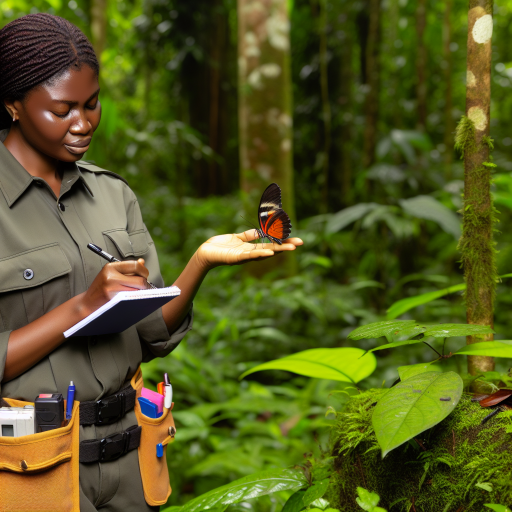Introduction
Environmental disciplines encompass the study of ecological systems, conservation, and sustainable practices.
These fields examine how human activities impact natural resources and ecosystems.
In Nigeria, the importance of environmental studies cannot be overstated.
The country faces numerous challenges, including deforestation, pollution, and climate change.
These issues threaten both biodiversity and human livelihoods.
Understanding these disciplines equips students with the knowledge to solve pressing environmental issues.
Moreover, it fosters a culture of sustainability vital for the nation’s future.
This blog post aims to guide potential students in Nigeria.
It will highlight various institutions offering environmental studies.
Additionally, it will explain the relevance of these studies in addressing Nigeria’s unique environmental challenges.
The Current State of Environmental Challenges in Nigeria
Nigeria faces numerous environmental challenges that threaten its ecosystem, economy, and the health of its citizens.
These challenges stem from various human activities, including industrialization, urbanization, and exploitation of natural resources.
Here, we will explore some of the most pressing environmental issues.
Overview of Environmental Issues
- Deforestation – Nigeria loses millions of hectares of forest each year, severely impacting biodiversity.
- Oil Spills – Oil spills in the Niger Delta have polluted land and waterways, affecting local communities’ livelihoods.
- Air Pollution – Industrial emissions and vehicular exhaust contribute to poor air quality, particularly in urban areas.
- Water Pollution – The contamination of water resources from industrial waste and untreated sewage is a widespread issue.
- Soil Degradation – Over-farming, deforestation, and industrial activities have led to serious soil erosion and nutrient depletion.
- Climate Change – Nigeria experiences increased flooding and droughts, significantly affecting agriculture and livelihood.
Each of these issues warrants immediate attention.
The environmental degradation tampering with Nigeria’s natural resources affects the climate, agriculture, and quality of life.
Consequently, adequately addressing these challenges requires a concerted effort and innovative solutions.
Statistics and Examples Illustrating the Severity of These Issues
Several alarming statistics showcase the severity of Nigeria’s environmental challenges:
- According to the World Bank, Nigeria loses about 3.5% of its GDP annually due to environmental degradation.
- Reports estimate that over 1 million hectares of forest are lost every year due to deforestation.
- In a study by the National Oil Spill Detection and Response Agency, Nigeria recorded over 7,000 oil spills between 1976 and 2020.
- Data from the WHO reveals that air pollution contributes to an estimated 2.2 million premature deaths each year globally, with many occurring in Nigeria.
- Over 70 million Nigerians lack access to safe drinking water, primarily due to pollution and mismanagement.
These statistics highlight the urgency of the situation.
The environmental challenges in Nigeria impact public health, livelihoods, and sustainable development.
If left unaddressed, these issues can have long-term, catastrophic consequences for both the environment and society.
The Need for Education and Expertise in Addressing These Challenges
The pressing environmental issues in Nigeria require well-trained professionals.
Education in environmental disciplines can provide the knowledge necessary for tackling these challenges effectively.
By investing in education, Nigeria can cultivate a workforce ready to implement innovative and sustainable solutions.
Here’s why education and expertise are crucial:
- Research and Innovation – Educated professionals can conduct research that leads to innovative solutions.
They can develop technologies and methods that can mitigate environmental degradation. - Policy Formulation – Experts educated in environmental science can help formulate effective environmental policies.
They can provide crucial insights that guide legislation and regulations. - Community Awareness – Education helps create awareness about environmental issues among local communities.
Educated individuals can educate others about sustainable practices. - International Collaboration – Trained professionals can collaborate with international organizations.
They can leverage support and funding for local initiatives. - Capacity Building – Education enhances the capacity of local organizations to address environmental challenges.
It strengthens community resilience against climate impacts.
In fact, Nigeria’s environmental challenges pose significant threats to its future.
Addressing deforestation, oil spills, pollution, and climate change requires immediate and concerted efforts.
Education in environmental disciplines stands as a crucial step toward developing a sustainable path forward.
Nigeria must invest in training the next generation of environmental experts now to protect its natural resources for future generations.
Types of Environmental Disciplines
Environmental disciplines encompass a wide range of fields that study the environment and its relationship with human activities.
Each discipline focuses on specific aspects of the environment, contributing to a comprehensive understanding of environmental issues.
Here, we discuss several key environmental disciplines to shed light on their significance and interconnection.
Environmental Science
Environmental Science integrates physical, biological, and information sciences.
It studies the environment and recognizes the impact of human actions.
The discipline focuses on topics such as:
- The study of ecosystems and biodiversity.
- Environmental monitoring and assessment.
- Pollution control and management.
- Climate change and its implications for different ecosystems.
Environmental Economics
Environmental Economics examines the economic aspects of environmental issues.
This field evaluates how economic activities affect the environment.
Key components include:
- Valuation of natural resources and ecosystem services.
- Cost-benefit analysis of environmental policies.
- Market-based strategies for environmental protection.
- Analysis of environmental regulations and their economic impact.
Environmental Law
Environmental Law focuses on the legal frameworks governing environmental protection.
This discipline encompasses various areas of law that influence the environment, including:
- International treaties on climate and biodiversity.
- National legislation addressing land use and pollution.
- Regulation of natural resource extraction.
- Enforcement mechanisms and legal actions for environmental protection.
Environmental Policy
Environmental Policy explores governmental actions addressing environmental issues.
This discipline analyzes how policies are created, implemented, and evaluated.
Key areas include:
- Formulating policies for sustainable resource management.
- Examining the role of stakeholders in policy development.
- Assessing the effectiveness of environmental regulations.
- Identifying gaps in policy frameworks related to emerging environmental challenges.
Conservation Biology
Conservation Biology is a discipline focused on preserving biodiversity.
Experts in this field study species and ecosystems to prevent extinction.
Important topics include:
- Habitat preservation and restoration.
- Endangered species recovery plans.
- Impact assessments for development projects.
- The role of protected areas in biodiversity conservation.
Environmental Management
Environmental Management emphasizes the sustainable use of natural resources.
This discipline integrates knowledge from various fields to achieve effective environmental management strategies.
Areas of focus include:
- Ecological footprint assessments.
- Waste management and pollution prevention.
- Environmental impact assessments (EIA).
- Corporate social responsibility and sustainability practices.
Importance of Interdisciplinary Approaches
Interdisciplinary approaches merge insights from different fields.
These approaches enrich environmental studies and lead to holistic solutions.
Stakeholders benefit from interdisciplinary collaboration in numerous ways:
- Comprehensive understanding of complex environmental issues.
- Development of innovative solutions that consider multiple viewpoints.
- Enhancement of policy-making through collaborative research.
- Improved communication between scientists, policymakers, and the public.
Current Trends in Environmental Studies
Environmental studies are evolving due to global environmental challenges.
Researchers increasingly adopt innovative strategies to address emerging issues.
Some current trends include:
- Integration of technology in environmental monitoring.
- Focus on climate change adaptation strategies.
- Emphasis on public participation and community-based conservation.
- Interlinking global environmental governance frameworks.
- Research on renewable energy and sustainable technologies.
In the context of Nigeria, these disciplines are crucial in addressing unique environmental challenges.
Rapid urbanization, deforestation, and climate change disproportionately affect the country.
Each discipline contributes solutions to mitigate these issues and promote sustainable development.
Studying various environmental disciplines provides vital skills.
Graduates play essential roles in shaping policies, enhancing management practices, and promoting conservation efforts.
Increased public awareness about environmental issues drives demand for experts in these fields.
As Nigeria continues to grapple with environmental challenges, understanding and embracing these disciplines become imperative.
Institutions offering programs in these fields equip students with the necessary knowledge and tools.
This leads to a generation of professionals committed to protecting Nigeria’s environment.
In short, environmental disciplines encompass a wide range of fields.
Understanding their interconnectedness is vital in addressing contemporary environmental issues.
As the world shifts towards sustainable practices, we can expect an increased focus on these disciplines in both education and practice.
Read: Importance of Safety in Nigeria’s Petroleum Engineering
Top Institutions Offering Environmental Disciplines in Nigeria
When it comes to studying environmental disciplines in Nigeria, several institutions stand out.
These universities offer comprehensive programs designed to address the pressing environmental challenges faced by the country.
Below is a detailed overview of some leading universities, their programs, and key features for prospective students.
List of Leading Universities and Their Programs
University of Lagos (UNILAG)
- M.Sc. in Environmental Management
- B.Sc. in Marine Biology
- B.Sc. in Environmental Science
University of Lagos
- Accredited by the National Universities Commission (NUC).
- Renowned faculty with expertise in various environmental fields.
- Extensive research projects focusing on urban ecology and climate change.
Obafemi Awolowo University
- Programs recognized and accredited by relevant bodies.
- Access to experienced faculty who contribute to leading environmental studies.
- Ongoing research initiatives that push for sustainable solutions.
University of Ibadan
- High academic standards, with full accreditation from the NUC.
- Professors with extensive research publications in environmental studies.
- Research collaborations with international organizations.
Ahmadu Bello University
- Programs accredited by national and international bodies.
- Faculty members are leading researchers in ecology and environmental health.
- Strong emphasis on field research and experiential learning.
Nnamdi Azikiwe University
- Accredited programs focusing on contemporary environmental issues.
- Access to faculty who offer mentorship and research guidance.
- Opportunities for students to participate in national conservation projects.
Comparison of Curriculum and Experience
Each institution provides a unique curriculum designed to equip graduates with the necessary skills.
Comparing courses helps prospective students make informed decisions:
University of Lagos
- Focus on urban environmental management.
- Involves practical lab work and projects.
- Emphasizes the importance of policy-making in environmental science.
Obafemi Awolowo University
- Rich interdisciplinary approach to environmental science.
- Field trips to ecological sites enhance practical learning.
- Curriculum includes climate change, sustainability, and resource management.
University of Ibadan
- Curriculum integrates theory with real-world applications.
- Focus on ecological research and biodiversity conservation.
- Students engage in community-based environmental projects.
Ahmadu Bello University
- Strong focus on environmental planning and policy.
- Hands-on research experience in local communities.
- Courses encourage critical thinking about sustainable development.
Nnamdi Azikiwe University
- Courses explore intersections of ecology, health, and development.
- Strong case studies and practical project work.
- Research opportunities in wildlife conservation and environmental chemistry.
Students can clearly see that each university offers a distinctive educational experience.
Carefully evaluating the curriculum and opportunities available will help potential students determine what aligns best with their career goals.
The choice of institution will ultimately shape students into capable professionals ready to tackle Nigeria’s environmental challenges.
In essence, the prospects for studying environmental disciplines in Nigeria are promising.
With numerous universities offering accredited programs, students can expect a rich curriculum.
Engaging with experienced faculty and accessing various research opportunities only adds to the allure of these programs.
Future environmental leaders will find abundant resources to prepare them for impactful careers.
Read: Community Involvement in Environmental Management Nigeria

Advantages of Studying Environmental Disciplines in Nigeria
Relevance to Nigeria’s Unique Environmental Landscape
Nigeria offers a diverse and unique environmental landscape.
Studying environmental disciplines in Nigeria provides direct exposure to these unique ecosystems.
Students gain firsthand experience with Nigeria’s rainforests, savannas, and coastal regions.
This exposure enhances their understanding of local environmental challenges.
The curriculum often includes case studies relevant to Nigeria’s environment.
Students learn how to address desertification, deforestation, and water management issues.
The knowledge gained is directly applicable to solving local environmental problems.
Opportunities for Internships and Fieldwork within Local Communities
Nigeria’s universities offer numerous internship opportunities.
Students can intern with environmental NGOs, government agencies, and private firms.
These internships provide practical experience and professional networking opportunities.
Fieldwork is a critical component of environmental studies in Nigeria.
Students engage in fieldwork within various local communities.
This hands-on experience enhances their learning and research skills.
Working with local communities provides insights into traditional environmental practices.
Students learn the importance of community involvement in environmental conservation.
Contribution to Sustainable Development Goals at the National Level
Studying environmental disciplines in Nigeria contributes to national sustainable development goals.
Students learn to develop and implement sustainable environmental practices.
They play a crucial role in promoting environmental awareness and education.
Their research helps in formulating policies for sustainable development.
Graduates can work with government agencies to implement environmental regulations.
They contribute to national efforts to combat climate change and protect biodiversity.
Their work supports Nigeria’s commitment to global environmental agreements.
Real-World Problem Solving
Studying environmental disciplines in Nigeria equips students with problem-solving skills.
They tackle real-world environmental issues through research and projects.
These skills are essential for developing practical solutions to environmental challenges.
Students learn to assess environmental impact and develop mitigation strategies.
They engage in projects that promote renewable energy and sustainable agriculture.
Their solutions address Nigeria’s specific environmental needs and challenges.
Building a Network of Professionals
Nigeria’s universities foster a network of environmental professionals.
Students connect with experts, alumni, and industry leaders.
This network provides support, mentorship, and career opportunities.
Engaging with professionals enhances students’ knowledge and skills.
Networking events, seminars, and conferences offer platforms for professional growth.
Graduates become part of a community dedicated to environmental conservation.
This network is invaluable for career advancement and collaboration.
Cultural and Contextual Understanding
Studying in Nigeria provides cultural and contextual understanding of environmental issues.
Students learn how cultural practices impact the environment.
They understand the importance of integrating cultural values in environmental conservation.
This knowledge is crucial for developing effective and culturally sensitive environmental solutions.
Students appreciate the role of indigenous knowledge in sustainable practices.
They advocate for inclusive environmental policies that respect cultural heritage.
Enhancing Employability
Graduates of environmental disciplines in Nigeria are highly employable.
They possess practical skills and relevant knowledge.
Employers value their hands-on experience and problem-solving abilities.
Graduates find opportunities in government, NGOs, and private sectors.
Their expertise is in demand for addressing Nigeria’s environmental challenges.
They contribute to the development of a sustainable and resilient Nigeria.
Read: Environmental Laws and Regulations in Nigeria
Career Opportunities in Environmental Disciplines
As Nigeria confronts pressing environmental challenges, the demand for skilled professionals in environmental disciplines rises significantly.
Graduates holding these qualifications can find rewarding careers across various sectors.
This section explores the diverse career opportunities available in environmental disciplines in Nigeria.
Overview of Career Paths Available
Individuals studying environmental disciplines can pursue a wide range of career paths.
These paths span three main sectors: non-governmental organizations (NGOs), government agencies, and the private sector.
Each sector offers unique opportunities and challenges.
Non-Governmental Organizations (NGOs)
NGOs play a critical role in addressing environmental issues.
They often focus on advocacy, education, and grassroots initiatives.
Graduates can find roles in:
Transform Your Career with Expert Guidance
Get personalized mentorship consulting that’s tailored to your unique path. Our expert advice is actionable and exclusive.
Get Started- Project Management: Overseeing environmental projects, managing budgets, and resources.
- Research and Analysis: Conducting studies on environmental impacts and sustainability practices.
- Community Engagement: Working directly with communities to implement conservation strategies.
- Policy Advocacy: Lobbying for policy changes that benefit the environment.
Government Agencies
Several government agencies in Nigeria require environmental expertise.
Graduates can work in:
- Environmental Protection: Ensuring compliance with environmental regulations.
- Urban Planning: Developing sustainable city plans and ensuring responsible land use.
- Wildlife Management: Protecting endangered species and their habitats.
- Climate Change Mitigation: Implementing strategies to address the impact of climate change.
Private Sector
The private sector also presents various opportunities for environmental professionals.
Companies increasingly recognize the importance of sustainability.
Employment opportunities include:
- Sustainability Consulting: Assisting businesses in developing sustainable practices.
- Environmental Compliance: Ensuring companies meet environmental regulations.
- Corporate Social Responsibility: Leading initiatives that focus on community and environmental welfare.
- Research and Development: Innovating new technologies or processes that minimize environmental impact.
Demand for Graduates with Environmental Expertise in Nigeria
The growing environmental challenges in Nigeria create a robust demand for graduates with environmental expertise.
Issues like deforestation, pollution, and climate change stress the need for skilled professionals.
According to recent reports, over 2 million hectares of forest land in Nigeria have been lost.
This alarming statistic underscores the urgent need for environmental managers and conservationists.
Moreover, the government’s commitment to the Sustainable Development Goals (SDGs) further enhances job prospects in this sector.
Many companies now prioritize sustainability, leading to an increased demand for environmental consultants.
These consultants guide businesses in implementing eco-friendly practices.
As industries evolve, professionals who understand environmental regulations are critical.
This knowledge ensures compliance and promotes sustainable development.
Case Studies of Successful Professionals in the Field
Examining successful professionals in environmental disciplines offers insight into potential career trajectories.
Here are a few notable figures who inspire aspirants.
Dr. Biodun Akinwunmi
Dr. Akinwunmi is a prominent environmental scientist.
He specializes in climate change and has worked with both government agencies and NGOs.
His research on coastal erosion has garnered international attention.
He currently advises the Nigerian government on climate policy.
Ms. Tolu Ogbodo
Ms. Ogbodo is the founder of a successful NGO focused on reforestation.
Her organization has planted over 500,000 trees in Nigeria.
Tolu’s work emphasizes grassroots community involvement.
Her achievements highlight the significant impact one dedicated individual can have on environmental conservation.
Mr. Chike Obi
Mr. Obi is an environmental consultant specializing in corporate sustainability.
He has helped major Nigerian firms reduce their carbon footprint.
His efforts have proven the business case for sustainability, showcasing the economic benefits of ecological practices.
Prof. Nneka Okafor
Prof. Okafor is a renowned academic and researcher in environmental science.
Her studies on sustainable agricultural practices have influenced policy at various levels.
Her contributions extend to community outreach, training farmers on environmentally friendly practices.
With the increasing focus on sustainability and environmental conservation, career opportunities in environmental disciplines in Nigeria are expanding rapidly.
Graduates can pursue various paths within NGOs, government agencies, and the private sector.
The demand for environmental expertise continues to grow, driven by urgent ecological challenges.
Success stories from professionals in the field reflect the potential impact individuals can have on Nigeria’s environmental future.
Hopeful candidates must equip themselves with knowledge and skills gained from reputable institutions.
They should also seek hands-on experience through internships and volunteer opportunities.
As they navigate their careers, graduates will contribute significantly to creating a healthier, more sustainable Nigeria.
Read: Environmental Management Internships in Nigeria
Challenges Faced by Students in Environmental Studies
Students pursuing environmental studies in Nigeria face numerous challenges.
These challenges stem primarily from economic, infrastructural, and educational factors.
Additionally, limited resources and funding significantly hamper research efforts.
Understanding these obstacles is crucial for potential students and educators alike.
By identifying these problems, we can discuss viable strategies for overcoming them.
Economic Challenges
Economic difficulties represent a significant barrier for students in environmental studies.
Many students cannot afford tuition fees or living expenses.
The following points illustrate these economic challenges:
- High Tuition Costs: Many universities charge substantial fees for environmental programs.
- Limited Scholarship Opportunities: Scholarships for environmental studies are rare, making financial aid scarce.
- Lack of Part-Time Job Opportunities: Many students struggle to find suitable work to support their studies.
- Inadequate Government Funding: Limited public funding affects the overall quality of education in Nigeria.
These economic challenges often discourage passionate individuals from pursuing their interests in environmental studies.
Students may feel trapped by their financial situations, leading some to abandon their dreams.
Infrastructural Challenges
The infrastructural landscape in Nigeria poses additional challenges for students in environmental studies.
Many institutions lack the necessary facilities, which inhibits effective learning.
Consider the following infrastructural issues:
- Poor Laboratory Facilities: Many institutions lack well-equipped labs for practical training.
- Inconsistent Internet Access: Limited access to reliable internet hampers research and learning opportunities.
- Unreliable Transportation: Transportation challenges affect students’ ability to attend classes or fieldwork.
- Insufficient Field Sites: Limited access to significant environmental sites restricts field studies and research.
Inadequate infrastructure often leads to subpar educational experiences, making it challenging for students to excel in their studies.
This issue negatively impacts the overall quality of environmental education in Nigeria, which is vital for sustainable development.
Educational Challenges
Educational obstacles also impede the progress of students in environmental studies.
Some institutions may not offer comprehensive curricula or trained faculty.
The following points highlight these educational challenges:
- Lack of Qualified Instructors: Some universities have a shortage of trained staff in environmental disciplines.
- Outdated Curriculum: Many programs do not incorporate the latest research or practices in environmental science.
- Poor Quality Resources: Students often struggle with inadequate textbooks and educational materials.
- Limited Research Opportunities: Few institutions provide platforms for students to engage in research projects.
These educational limitations can hinder students’ ability to gain valuable knowledge and skills.
Thus, many graduates may find themselves inadequately prepared for their careers.
Lack of Resources and Funding
Many students face scarcity regarding research resources and funding in environmental studies programs.
Those limitations can impede progress and innovation.
Here are some notable issues:
- Insufficient Research Grants: Many students find it challenging to secure grants for their projects.
- Lack of Access to Journals: Limited access to academic journals restricts students’ ability to conduct rigorous research.
- Scarcity of Field Equipment: Students often lack access to necessary tools for environmental research.
- Poor Institutional Support: Many institutions fail to provide adequate support for student-led research initiatives.
These resource limitations can stifle the academic interests of students, reducing their ability to pursue impactful research.
Consequently, environmental studies may lack the innovation and creativity needed for meaningful change.
Strategies for Overcoming Challenges
Despite these hurdles, students can adopt several strategies to overcome challenges in environmental studies.
Understanding how to navigate these obstacles is essential for success.
Here are some effective approaches:
- Seek Scholarships: Students should actively search for scholarships offered by universities or organizations.
- Utilize Online Resources: Students can leverage free online materials to supplement their learning.
- Form Study Groups: Collaborative learning with peers can enhance understanding and support.
- Engage in Networking: Building connections with professionals in the field can create opportunities for mentorship and research.
- Participate in Community Projects: Engaging with local environmental initiatives can provide practical experience.
- Advocate for Better Funding: Students can join forces to advocate for increased funding for their programs.
- Utilize Social Media: Platforms like Twitter and LinkedIn can help students share research and connect with experts.
Implementing these strategies can empower students to overcome systemic barriers in environmental studies.
As a result, they can develop the knowledge necessary to contribute positively to society.
By addressing and overcoming these challenges, students in Nigeria can pave the way for future environmental studies’ success.
A stronger educational framework must exist to prepare students for the evolving demands of the workforce.
Armed with determination and resourcefulness, students can navigate their journeys despite existing obstacles.
Conclusion
Environmental disciplines play a crucial role in Nigeria’s future.
They address pressing challenges like pollution, deforestation, and climate change.
These fields contribute to sustainable development, ensuring resources for future generations.
Education in environmental studies equips individuals with the knowledge to tackle these pressing issues.
Prospective students should consider pursuing environmental disciplines.
They can make significant contributions to Nigeria’s ecological and social landscape.
Policymakers must also prioritize these fields in national development plans.
By investing in education, Nigeria can create a workforce skilled in sustainability.
A vision for a sustainable future is achievable with the right education.
Equipped individuals can innovate solutions to environmental challenges.
Their efforts can lead to improved policies and practices.
Collective action can foster environmental stewardship across the nation.
In general, education in environmental disciplines is vital.
It cultivates responsible citizens who understand the importance of sustainability.
By engaging students and policymakers, Nigeria can pave the way for a greener future.
Everyone has a role in this mission, and together, progress is possible.




